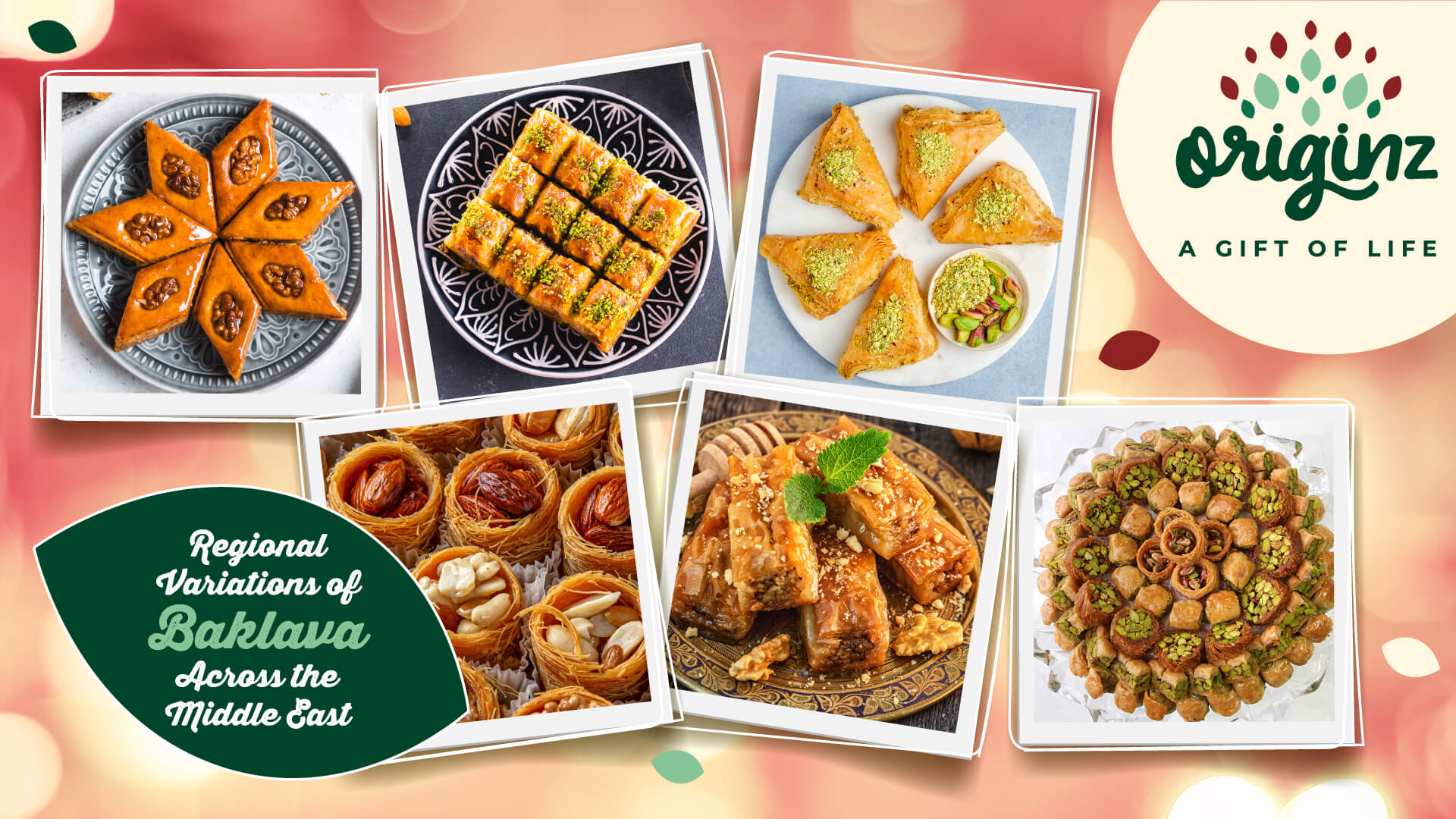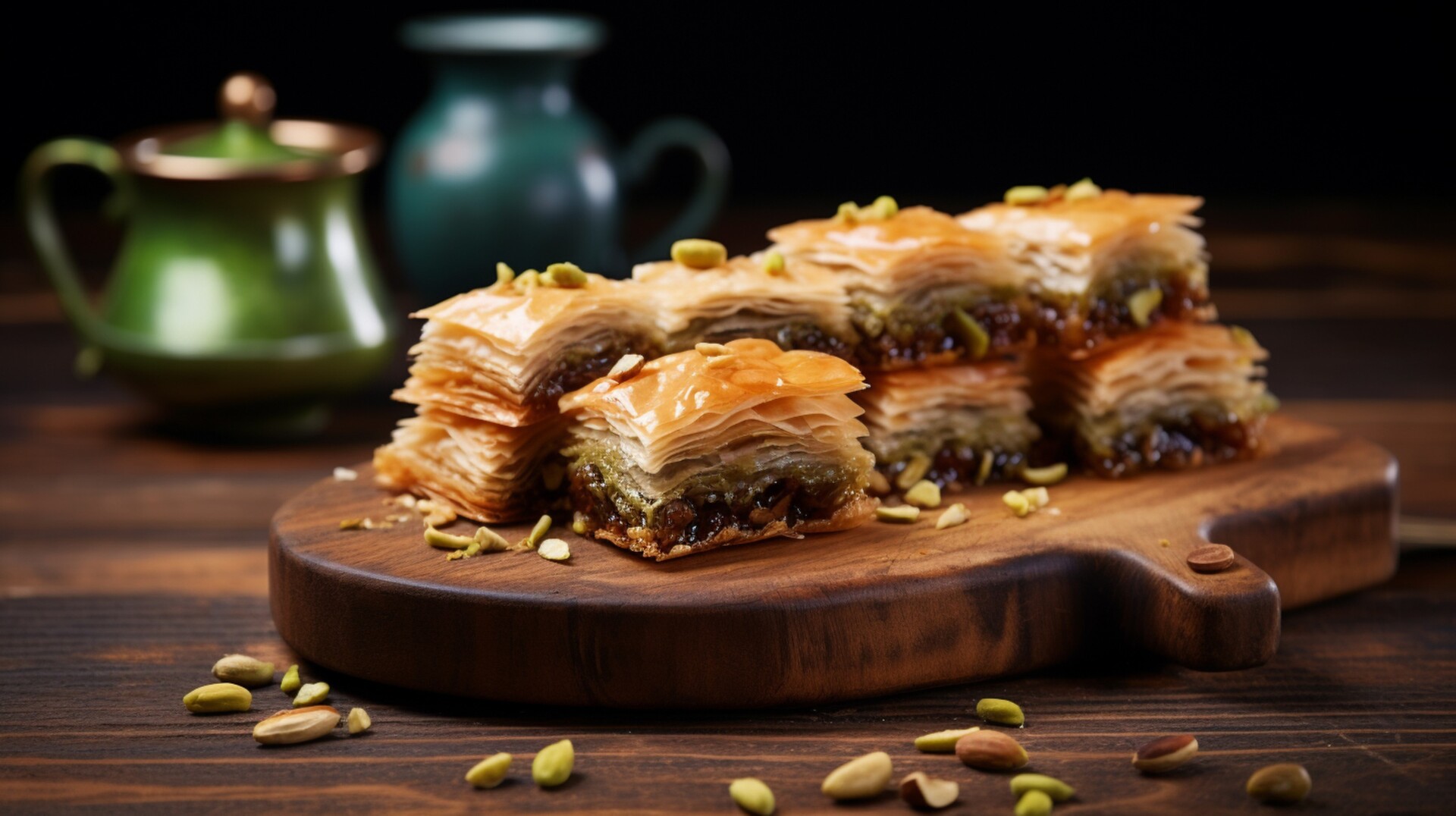
Regional Variations of Baklava Across the Middle East
Introduction
Baklava is a beloved dessert that has delighted taste buds
for centuries. With its origins tracing back to the Ottoman Empire, this sweet
treat has evolved into various forms across the Middle East. From Turkey to
Lebanon, and Greece to Persia, baklava has adapted to local tastes and
ingredients, resulting in a plethora of baklava variations that each tell their
own story. In this blog, we will explore the regional varieties of baklava,
highlighting how each culture has put its own spin on this classic dessert.

Turkish Baklava
Turkey is often considered the heartland of baklava.
Turkish baklava is known for its thin layers of phyllo dough, generously filled
with a mixture of finely chopped nuts, usually pistachios or walnuts, and
sweetened with a syrup made from sugar, water, and lemon juice. The defining
characteristic of Turkish baklava is its lightness and the use of clarified
butter, which imparts a rich, but not greasy, taste. One of the most famous
cities for baklava in Turkey is Gaziantep, where you can find baklava that
adheres to traditional recipes passed down through generations.
Arabic Baklava
Arabic baklava, popular in countries such as Lebanon,
Jordan, and Syria, has its own distinctive features. One notable difference is
the use of rose water and orange blossom water in the syrup, which adds a
fragrant floral note that distinguishes it from other varieties. Additionally,
Arabic baklava often includes a mix of different nuts, such as pistachios,
walnuts, and almonds. The dough in Arabic baklava is usually thicker, resulting
in a more substantial and hearty texture. This version of baklava is often less
sweet than its Turkish counterpart, making it a favourite among those who
prefer a more balanced flavour profile.
Greek Baklava
Greek baklava is another prominent variation, known for its
dense texture and honey-based syrup. Unlike Turkish and Arabic baklava, which
typically use a simple sugar syrup, Greek baklava is drenched in a rich syrup
made from honey, cinnamon, and cloves. This imparts a deep, spiced flavour that
is uniquely Greek. The nut filling usually consists of walnuts and almonds,
which are coarser than the finely chopped nuts found in other regional baklava
variations. Greek baklava is also known for its diamond-shaped pieces, which
are often garnished with a sprinkle of ground cinnamon.
Persian Baklava
In Iran, baklava takes on a unique form that reflects
Persian culinary traditions. Persian baklava is usually flavoured with cardamom
and rose water, giving it a distinctive taste that sets it apart from other
varieties of baklava. The use of ground almonds or pistachios as the primary
nut filling is common, and the pastry is often cut into smaller, more delicate
pieces. The syrup used in Persian baklava is lighter and less sticky, resulting
in a dessert that is subtly sweet and fragrant. This variety of baklava is
often enjoyed with a cup of Persian tea, making for a delightful pairing.
Baklava in the Levant
In the Levant region, which includes countries like Lebanon, Syria, and Palestine, baklava is celebrated for its variety and complexity. Levantine baklava can be found in many shapes and sizes, from rolls and nests to squares and diamonds. The nuts used in the filling are often a mix of pistachios, pine nuts, and cashews, providing a rich and varied texture. The syrup is typically infused with orange blossom water or rose water, giving it a refreshing aroma. One popular variation is the "bukaj" or "bouaj," which is a small, tightly rolled piece of baklava filled with a mix of nuts and sweetened with a light syrup.
The Organic Trend
With the growing interest in organic foods, many baklava makers are now offering organic versions of this traditional dessert. Using organic ingredients, such as nuts, butter, and honey, not only enhances the flavour but also ensures that the baklava is free from pesticides and artificial additives. For those interested in trying organic baklava, visiting an organic grocery store can provide access to high-quality ingredients that make a noticeable difference in the taste and quality of the dessert. Additionally, exploring delicious recipes for making baklava at home can be a rewarding experience, allowing you to control the ingredients and tailor the flavours to your preferences.
Conclusion
Baklava is more than just a dessert; it is a symbol of
cultural heritage and culinary artistry across the Middle East. From the
delicate, rose-scented layers of Arabic baklava to the honey-soaked sweetness
of Greek baklava, each variety tells a story of regional flavours and
traditions. Whether enjoyed with a cup of tea or shared at a festive gathering,
baklava continues to be a beloved treat that brings people together. As the
demand for organic products grows, so too does the opportunity to enjoy baklava
made with the finest, most natural ingredients, ensuring that this timeless
dessert can be enjoyed by future generations.
FAQs
What makes Arabic baklava different from other varieties?
Arabic baklava is distinct due to its use of rose water and
orange blossom water in the syrup, which adds a floral aroma. Additionally, it
often features a mix of nuts such as pistachios, walnuts, and almonds, and has
a thicker dough compared to other regional varieties.
Can baklava be made with organic ingredients?
Yes, baklava can be made with organic ingredients. Using
organic nuts, butter, and honey can enhance the flavour and ensure the dessert
is free from harmful chemicals. For high-quality organic ingredients, you can
visit an organic
grocery store such as Originz.
Are there any special recipes for making baklava at home?
There are many delicious recipes for making baklava at home
that cater to different tastes and preferences. By exploring delicious recipes, you can find a
variety of methods and ingredient combinations to create your perfect baklava.
Further Read,
Latest Blogs

Maintaining Healthy Habits After Ramadan
Have Ramadan healthy meals after Ramadan and maintain healthy food habits and implement them in your daily lives. Read more about healthy food habits.

Authentic Middle Eastern Iftar Meals to Prepare This Ramadan
Prepare some authentic middle eastern iftar meals this Ramadan. Look for fresh Ramadan food ideas and make your day memorable with these dishes. Check them out.

Ramadan Dishes to Cure Fasting Fatigue
Don’t worry about fasting fatigue anymore as we have listed some best Ramadan dishes and easy iftar meals to support your fasting journey. Check them out.

Eid-al-Fitr Feast: Delicious Recipes to Celebrate the End of Ramadan
Celebrate the end of Ramadan with delicious recipes on the eve of Eid ul Fitr. Read more about the traditional Ramadan recipes and make them easily.